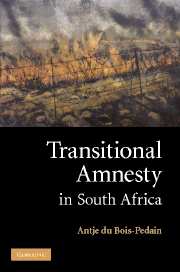Book contents
- Frontmatter
- Contents
- List of cited Amnesty Committee hearing transcripts
- Frequently cited Amnesty Committee decisions
- List of abbreviations
- List of abbreviated cases
- List of figures
- Preface
- Introduction
- 1 The TRC-based Amnesty Scheme: Background and Overview
- 2 The Practice of the Committee When Making Decisions
- 3 The Committee's Interpretation of the Political Offence Requirement
- 4 The Concept of Full Disclosure
- 5 Truth Recovery in the Amnesty Process
- 6 Victim Empowerment in the Amnesty Process
- 7 Perpetrator Accountability in the Amnesty Process
- 8 Conditional Amnesty and International Law
- 9 Conclusion
- Bibliography
- Index
Introduction
Published online by Cambridge University Press: 24 July 2009
- Frontmatter
- Contents
- List of cited Amnesty Committee hearing transcripts
- Frequently cited Amnesty Committee decisions
- List of abbreviations
- List of abbreviated cases
- List of figures
- Preface
- Introduction
- 1 The TRC-based Amnesty Scheme: Background and Overview
- 2 The Practice of the Committee When Making Decisions
- 3 The Committee's Interpretation of the Political Offence Requirement
- 4 The Concept of Full Disclosure
- 5 Truth Recovery in the Amnesty Process
- 6 Victim Empowerment in the Amnesty Process
- 7 Perpetrator Accountability in the Amnesty Process
- 8 Conditional Amnesty and International Law
- 9 Conclusion
- Bibliography
- Index
Summary
South Africa's transition to democracy is often heralded as a ‘miracle’, and it is not difficult to see why this should be so. By the early 1990s South Africa was disintegrating politically and deteriorating economically. Its government was not only morally bankrupt but also increasingly inefficient at curbing the ever-rising levels of political violence. The overall death toll from political incidents rose sharply between 1980 and 1990, and even more so after the release from prison of Nelson Mandela and the unbanning of the African National Congress (ANC) and other previously proscribed organisations in February 1990. Moreover, an increasing proportion of killings were directly attributable to non-state agents (though suspicions persist that many of these were due to vigilante groups whose activities were tolerated if not supported by the police and that there existed a ‘third force’ resulting from a security force strategy to act in non-traceable ways through third parties).
Most of the victims were black, but whites were also increasingly touched by the violence. In the townships and other large predominantly black settlements, the successes of the ungovernability campaign launched by the ANC in the mid-1980s combined with the growing conflict between, on the one hand, conservative-minded and often state-funded ‘traditional’ power-holders in the black communities and their supporters, and, on the other hand, the newly openly visible political competition from the reform-minded ANC to create a volatile mix which erupted in street-fights and assassinations.
- Type
- Chapter
- Information
- Transitional Amnesty in South Africa , pp. 1 - 16Publisher: Cambridge University PressPrint publication year: 2007



